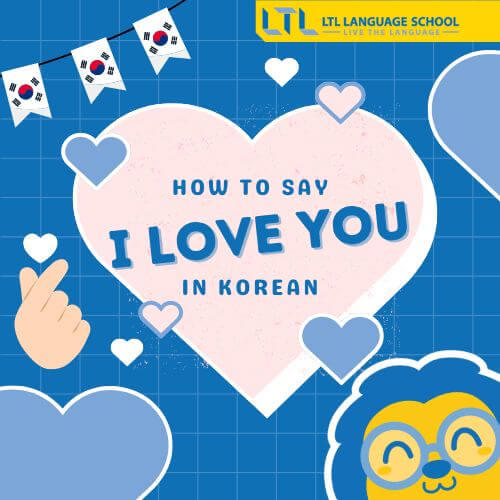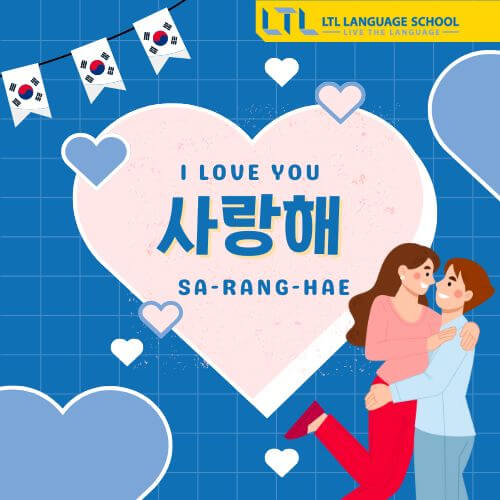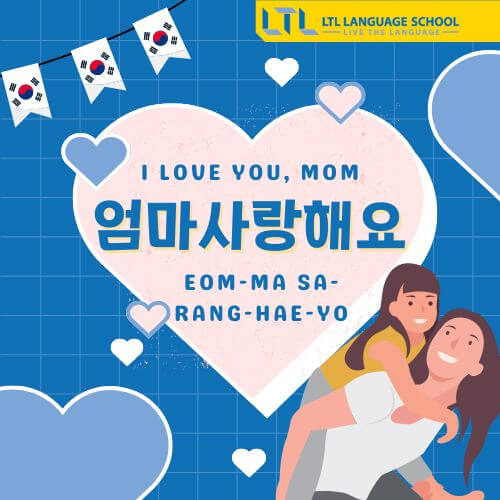The Three Little Words: I Love You in Korean 💖
Ready to Drop an L-Bomb? Let’s Learn How to Say ‘I Love You’ in Korean!

If you are a K-drama or K-pop fan you most probably heard these three little words, 사랑해 (sa-rang-hae) numerous times.
These sweet words are so powerful we don’t get tired of hearing them.
Koreans are very affectionate people and often express their love or friendship with these words so don’t be surprised if you hear this from a Korean friend! Take advantage of this expressive language and use it to your advantage.
Now let’s dive in and master the subject of love in Korean and learn a few different ways to express those deep feelings!
I Love You in Korean || Three Ways to Say I Love You
I Love You in Korean || How To Add ‘You’
I Love You in Korean || How to Say I Love You So Much
I Love You in Korean || How to Say I Love You Too
I Love You in Korean || FAQs
I Love You in Korean || Three Ways to Say I Love You
In English, I Love You is a straightforward expression you can use in almost any situation.
Since the system of Honorifics plays a vital role in the Korean language, even “I Love You” needs to be carefully worded.
Maybe this might sound a bit funny but that’s what the beauty of learning a language is all about! To learn more about this, check out our Guide to Korean Honorifics.
Here are some common ways to say I love you in Korean listed in the sequence from the most polite to the most casual. 👇
사랑합니다 (sa-rang-ham-nida)
사랑해요 (sa-rang-hae-yo)
사랑해 (sa-rang-hae)
사랑합니다 (sa-rang-ham-nida)
This is the most formal way to say I love you in Korean.
This is not the most common but is used in situations that require politeness. Let’s say a K-pop idol in his or her fan meeting wants to express his love to the fans. Ideally, he or she would wrap up the fan meeting by saying these words.
K-pop star: 여러분 사랑합니다 (yeo-reo-bun sa-rang-ham-ni-da)
English: I love you everyone!
If you were to add a name with 사랑합니다 (sa-rang-ham-nida) you would add the honorific 님 (nim) behind the name. One important tip to remember is that Koreans will almost never call someone’s name without adding an honorific. The only time a Native will omit honorifics is to someone they are very close to. 님 (nim) is the most formal way to address a person by name.
Other than its use with names, this is also used after a profession or a relationship like 선생님 (seon-seang-nim) or 어머님 (eo-mo-nim) to show the highest of respect.
Profession: 선생님 (seon-saeng-nim) – Teacher
Relationship: 어머님 (eo-mo-nim) – Mother
Let’s practice some examples using the honorific 님 (nim). If you want to say I love you to your favorite K-pop star using her name, this would be the best way to say it.
Her Name: 미나 (Mina)
미나님 사랑합니다 (mi-na-nim sa-rang-ham-ni-da)
English: I love you Mina!
Another popular situation you would use this form of I Love You is to your teacher.
Title: 선생님 (seon-saeng-nim) – Teacher
선생님 사랑합니다 (seon-saeng-nim sa-rang-ham-ni-da)
English: I love you teacher!

Chilseok // The Story of Two Lovers and 2025 Date
Everything You Need to Know About Chilseok The story of Chilseok (칠석) is taken from the famous Chinese folk tale “The Cowherd and the Weaver Girl.”. It celebrates the one day a year when Jiknyeo 직녀 and Gyeonwu 견우, a couple…
사랑해요 (sa-rang-hae-yo)
This is a more common way to express I love you. It’s respectful but shows a closer relationship. Natives would use this in most situations so if you are unsure which I love you to use, this is the safest expression to choose.
Let’s use the same example above but with 사랑해요 (sa-rang-hae-yo).
Korean: 미나씨, 사랑해요 (Mi-na-ssi sa-rang-hae-yo)
English: I love you, Mina!
👉 Since this is a polite form we will address the name with a 씨 (ssi) rather than a 님 (nim) behind the name. 씨 (ssi) is an honorific that shows politeness but less formal. It’s most similar to how we use Ms. or Mr. in English.
사랑해 (sa-rang-hae)

Last but not least, the most favorite way to say I Love You is 사랑해 (sa-rang-hae).
사랑해 (sa-rang-hae) is also a popular word you hear in K-dramas. Use this to the ones you are closest to and of course to that special person in your life.
Since 사랑해 (sa-rang-hae) is the most casual form, you won’t add 씨 (ssi).
Instead, add the vocative case marker 아 or 야 (ah / ya) behind the name depending on the consonant or vowel.
Korean: 미나야 사랑해 (Mi-na-ya sa-rang-hae)
English: I love you, Mina
I Love You in Korean || How To Add ‘You’
You’ll notice that all the I love you forms we learned do not have an I or you in the expression. This is because we often know who we are talking to so we don’t necessarily include them.
However, it’s okay to include them and here is how to do it…
For 사랑합니다 (sa-rang-ham-nida)
당신을 사랑합니다 (dang-shin-eul sa-rang-ham-ni-da)
당신 (dang-shin) is a formal way to say you in Korean.
For 사랑해요 (sa-rang-hae-yo)
엄마사랑해요 (eom-ma sa-rang-hae-yo) means I love you, Mom.
You could also use 당신 (dang-shin) here and say 당신을 사랑해요 (dang-shin-eul sa-rang-hae-yo).
For 사랑해 (sa-rang-hae)
너를 사랑해 (neo-leul sa-rang-hae).
너를 (neo-leul) is an informal way to say you.

Korean Dating Culture 101💖
All You Need to Know About the Dating Culture in Korea PLUS Must-Know Vocab Are you curious about the dating customs in Korea? Is it really as dreamy and romantic as what you normally see in K-dramas? I believe for…
I Love You in Korean || How to Say I Love You So Much
What if just a standard I love you is not enough?
If you love someone so much that a simple ‘I love you’ can’t express it enough here are some ways you can add so much – 정말 많이 (cheong-mal ma-ni) or very much – 아주 많이 (a-ju ma-ni).
정말 많이 (cheong-mal ma-ni) – So Much
💞 정말 많이 사랑합니다 (cheong-mal ma-ni sa-rang-ham-nida)
💞 정말 많이 사랑해요 (cheong-mal sa-rang-hae-yo)
💞 정말 많이 사랑해 (cheong-mal sa-rang-hae)
아주 많이 (a-ju ma-ni) – Very Much
💞 아주 많이 사랑합니다 (a-ju ma-ni sa-rang-ham-nida)
💞 아주 많이 사랑해요 (a-ju ma-ni sa-rang-hae-yo)
💞 아주 많이 사랑해 (a-ju ma-ni sa-rang-hae)


I Love You in Korean || How To Say I Love You Too
Here is how to say I love you back when someone tells you the L-word.
당신을 사랑합니다
I love you저도 당신을 사랑합니다
I love you too👉 저 (cheo) means me in polite form and 도 (do) means too.
And if your mom tells you she loves you too?
엄마 사랑해요
I love you, Mom나도 사랑해
I love you tooWhen your mom replies back to you she won’t use the honorifics but instead be casual and say 나도 사랑해 (na-do sa-rang-hae).
You can use 저도 (cheo-do) also in this case if you will be replying back to someone other than your parents.
Example: 저도 사랑해요 (cheo-doe sa-rang-hae-yo).
Now that you mastered the L-word in Korean, get out there and spread some love! Don’t be afraid to express.
Remember that the most common way to say I Love You is 사랑해요 (sa-rang-hae-yo), so whenever you are in doubt, use this!
BONUS || Now that you’ve learned how to say ‘I love you’ in Korean, why not learn it in some other languages?
👉 I love you in Mandarin Chinese
I Love You in Korean || FAQs
What is a popular way to write I love you in Korean?
사랑해 (sa-rang-hae)
How would a female tell an older male I love you in Korean?
오빠 사랑해요 (oppa saranghaeyo) or 오빠 사랑해 (oppa saranghae)
How would a male tell an older female I love you in Korean?
누나 사랑해요 (nuna saranghaeyo) or 누나 사랑해 (nuna saranghae)
How can you call someone you love in Korean?
자기야 (jagiya)
Want More From LTL?
FANCY LEARNING KOREAN? Check out our online Korean courses here.
We offer a 7-day free trial to all online students where you can study Korean 24/7.
Want to study Korean in Korea instead? Our Korean courses in Seoul can either be taken in small groups of no more than 5 students or individually for a more tailored experience.
We even offer incredible homestay experiences in Seoul too.
To top it all off, it certainly doesn’t end with Korean. Check out the other languages we teach 👇🏻









